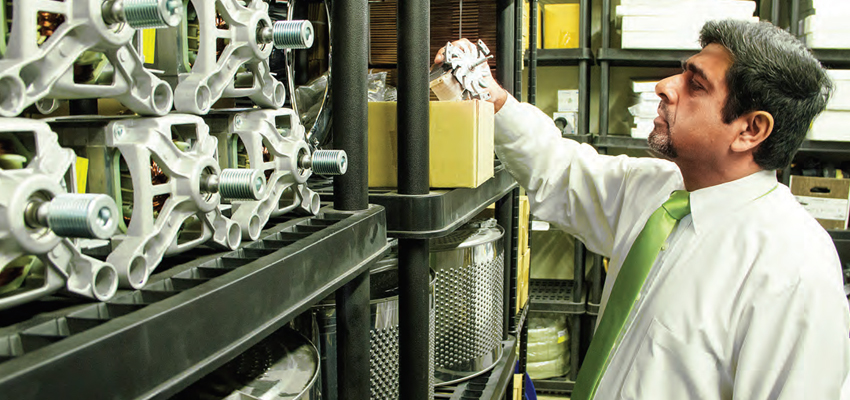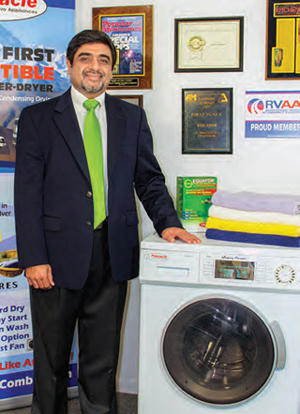Transformative LEADERSHIP

Entrepreneurship seems attractive to everyone. But no one prepares you for the challenges and pitfalls along the way to success. Perhaps, no one knows this better than Atul Vir, CEO & Founder, Equator Advanced Appliances. Going from a military boarding school in Pune to becoming a reputed Chartered Accountant to establishing a successful home appliance brand in the US, Atul has seen it all. His work has led to 18 patents and a global reputation for innovation. Speaking with Corporate Citizen, he shares his journey to the helm of Equator Advanced Appliances, the challenges he faced on the way and how Covid-19 affected the way businesses operate
Corporate Citizen: Tell us about your formative years growing up.
I was born in Pune. I went to a military boarding school in India as a result of my father’s frequent posting in the armed services. Apart from an excellent all-round education, it taught me to be independent from the age of 10. On the other hand, while it trained us for success, it was also quite protected and did not expose us to the realities of life. I then went to Wadia College in Pune, before moving out of India.
CC: You went from being a CA to becoming a successful businessman in the US. How did this transformation come about?
Accounting is a precise science and I was trained to be a professional auditor. My first overseas assignment was in Ivory Coast, West Africa, to investigate fraud for a British company. After the managers were sent to jail, the other investigator and I had to run the company and this opened me to the world of international business. Over the next few years, I grew in seniority until I was practically running the eight countries in the region. The company’s plans were derailed due to a coup d’état in Nigeria, which devalued the currency leading to its bankruptcy. This led me to immigrate to the US where I thought I would get a well-paying job with my global experience. Unfortunately, this did not happen as potential employers said I did not have the requisite education or local experience in the US. As a result, I decided to become an entrepreneur. I am now completing 30 years and recently published my book, ‘Underdog Thinking’, which is about all the lessons I learned as a CA with a rigid Indian education and how I transformed to a global entrepreneur where one has to be flexible by the minute.
CC: What were the challenges you faced while setting up Equator Advanced Appliances?
There were many challenges. Due to the bankruptcy of my previous employer, I also lost a large sum in unpaid salary. So, apart from not having a local network of friends and family to ask for professional advice, I also did not have financial resources. While in Africa, I held a senior expat position with four people working in my household. Moving to the US was a rude awakening. I had to learn to do everything myself and contribute efforts to run to the household, including cooking, washing clothes and dishes, cleaning the floor and taking out the garbage. This exposed me to the everyday tasks that needed to be done in every household and set me on the path to try and find easier solutions.
CC: The home appliance segment is extremely competitive, especially in a developed market like the US. How did you differentiate your offerings from the competition?
Since I was new to the US, I could immediately differentiate products that I came across with the ones I had seen in my travels. This allowed me to sense opportunities to offer a better version to the customer. The answer lay in innovation by offering a better product, but I also had to learn marketing, local financing, local laws etc. to transform these ideas into a successful enterprise.
CC: Your work has resulted in 18 patents. Tell us about some of them.
My first appliance was a combination washer-dryer that I introduced to the US in collaboration with an Italian manufacturer. The product was a great success and we started getting letters from customers who were happy with the product but also suggesting improvements. I transformed many of these into better designs and performance, all with the goals of making life easier for the customer. These include ergonomic controls and displays as well as functional aspects to improve wash and dry performance.
CC: Culture is integral to the success of an organisation. How did you foster a culture of innovation, especially in the early years?
We were always a customer-centric organisation and listened to customer comments and particularly customer complaints. These led us to improve our products. Cutting costs and saving money in pursuit of profits was not the most important factor and all members of our organisation know this. We also have a programme for our team members who are rewarded for innovation not only to better our products but also for more efficient company processes.
"Nothing gives me more satisfaction than hearing from a woman consumer who appreciates our efforts in freeing up her time, allowing her to lead a more productive life"
CC: You have recently made a foray into the Indian market. What according to you is the potential in India?

We have recently entered India with our core product, the combo washer-dryer. There is a huge potential with this product with the new professional middle-class who are not only prepared to work hard, but also want the quality of life for themselves and their family. Labour and time-saving appliances are part of the equation and help families achieve this. We have other appliances in the pipeline that are part of our clean energy programme, including dishwashers, vacuum cleaners, portable air-conditioners and induction cooktops.
CC: You have a great experience in consumer psychology from your experience. What differentiates the Indian customer from the western customer, and have you adapted your offerings accordingly?
The new Indian consumer is no different to consumers in the other countries we operate in. They want value for money, strong products that last and good customer service to take of problems. We are an independent boutique brand competing against giant global multinationals with unlimited budgets, however, we too have to deliver these values. Each of our products is innovative in its own way and they make household chores easier.
CC: Are you planning to expand to newer markets?
We have developed our technologies for both developed and developing countries for the common problems of the future. These include saving energy, water and reducing pollution. We will soon be coming out with specific products for the Middle-East, South-East Asia and Europe.
CC: How has Covid-19 changed the way your company works, and how has it changed you personally?
As a global company operating in remote locations, we were prepared from an operational standpoint. At the beginning of the pandemic, we had production disruptions but these were soon resolved in the middle of 2020. We have learned to be ready for production delays, be agile with logistics and have strengthened our customer service so we can keep customers informed about any disruptions in delivery, service etc. From a personal standpoint, I am grateful to our employees who have become closer working through a crisis and finding solutions and I appreciate their work to form the backbone of the company’s smooth operations.
CC: When you look back on your journey, what are some of the key initiatives you have taken at the helm of Equator, which you are most proud of?
I take pride in the innovations we have brought out. Our field is household appliances, and these are used mainly by women around the world in improving the lives of their families. Nothing gives me more satisfaction than hearing from a woman consumer who appreciates our efforts in freeing up her time, allowing her to lead a more productive life. We are living through a time with women empowerment as a global movement and I am glad to have been able to participate and contribute in our own small way.
CC: What is your idea of relaxation?
I was a musician in my school orchestra playing the sitar. I still play this for relaxation on weekends. I also like to cook and play tennis.